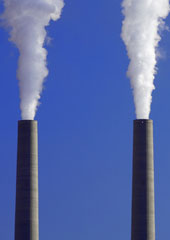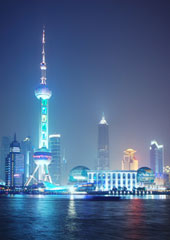The U.S. Yearning for Systemic Uncertainty
Why is it that U.S. business and society seem less well prepared to tackle a long-term challenge such as climate change?
January 25, 2013

U.S. businesses like to talk about the need for certainty. In the aftermath of the 2007-08 financial crisis, they made an entire industry out of the claim that more certainty would lead to better investment horizons.
And yet, it is an indisputable fact that U.S. conservatives and corporate interests conspire in the political process not to have long-term perspectives. That, they believe, would unduly restrict the freedom of maneuver of U.S. corporations.
It is a well-known fact that the planning horizon required for energy and environment projects often requires a minimum of 30 years. Thinking in such long arcs feels quite natural to the Chinese and the Europeans. No wonder they are also the ones willing to engage in long-term thinking on the environment.
Under these circumstances, it is no surprise that climate change is just one more field in which America’s penchant for short-termism comes to haunt itself. By the same token, other societies see the United States in danger of entering some form of a new dark age.
Perhaps we will indeed get lucky and American short-termism and business opportunism will manage to complement more fundamental and long-term strategies, as practiced by the Europeans.
To be sure, we are at a frontier the world hasn’t faced in years. Ever since the invention of the railway, it has been the United States and its economy that has served the world as the engine of transformation to a newer and higher state of technology and quality of life.
Also to be sure, there are plenty of NGO representatives and environmental activists in the United States who are political realists and yet remain optimists on what the United States can do for energy transformation.
The activists see many forces for real good, far away from the falsely alluring suggestions of shale gas and the like. They point to pure business rationale and the market as the forces driving the U.S. economy toward a cleaner state.
For example, coal plants are being closed (and new ones are not being built) because they is no longer economically feasible. And car manufacturers are using lighter materials and hence driving down fuel consumption.
All true, but this is the result more of happenstance than of a real strategy. It takes quite accidental happenings and elevates them artificially to the level of being “planned” or strategic.
What remains in fundamental dispute in U.S. political circles is any serious acceptance of the fact that we will need to restrain our boundless consumption — that we need to do more with less.
In addition, because the United States for the first time has had a very serious bout with its limits of growth (and the related inherent optimism), it is falsely casting itself as a “poor” nation — too poor to prioritize environmental action.
The Europeans certainly aren’t any richer, but they have the distinct advantage of not feeling like they are God’s chosen few. Through the force of their own history, they know the importance, inevitability and healing power of self-denial.
This lay of the land leads to a tantalizing role reversal. The formerly old world of Europe and the presumably spent force of China are remaking themselves and accepting the profound challenges of modernity.
They don’t have a clear pathway to the answers and ultimate solutions. But at least there is next to no domestic dispute about the need to accept the challenge, without any reservation.
In contrast, the United States, for a long time synonymous with the very idea of modernity, is casting itself in the cloak of the ancient. Stunning numbers of people there resort to notions such as God’s will and even dispute the concept of evolution to pull an escapist act.
They are not prepared to accept any need for changing their behavior and consumption patterns. They do not see that a superior standard of living comes with certain obligations.
In the modern era, it was always understood that the role of rich countries was to assume the burdens of progress. That meant being a bit tougher on themselves, if for no other reason than to stay ahead in the global race.
No nation embodied this spirit better and more feverishly than the United States. Optimism and a very real sense of can-do were the very essence of the American mantra. Now that spirit seems lost.
For the rest of the world, the current, suboptimal state of affairs means something uncomfortable, yet exciting. Rather than relying on the United States as the longstanding leader and continuing to act like mere understudies and followers, other countries are now collectively thrust back upon themselves and their own ability to engineer meaningful change.
The United States as an Anti-Modernity Force is a five-part series by Stephan Richter on the United States’ inability to play a leading role in the global debate on climate change:
1. Climate Change and the Claim to Global Leadership
2. Optimism as a Force for Good — And Doing Nothing
3. The U.S. Refusal to See China as a Positive Challenge
4. Yearning for Systemic Uncertainty
5. Turning Environmental Threats into Profits
Takeaways
The Chinese and Europeans actually like to think in long-term horizons. That bodes well for their strategies on the environment.
Climate change is just one more field in which America's penchant for short-termism comes to haunt itself.
U.S. businesses like to talk about the need for certainty. Yet, they conspire in the political process not to be confronted with long-term challenges.
NGO representatives remain optimists on what the United States can do for energy transformation. They point to pure business rationale and market thinking.
The United States casts itself as a "poor" nation — too poor to prioritize environmental action.

